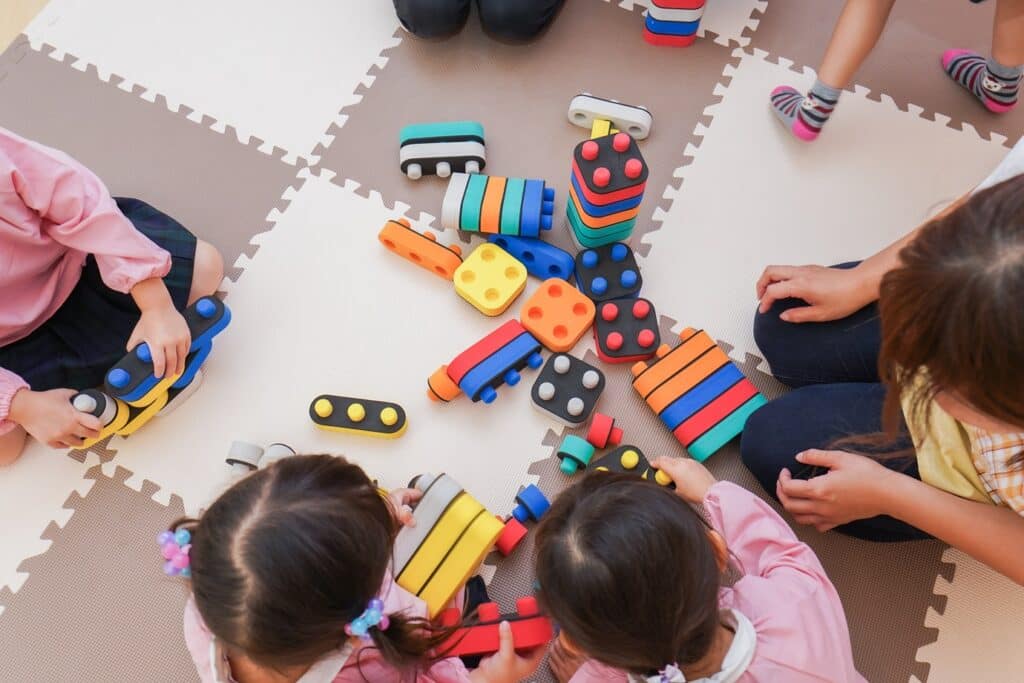The last month in the early learning space has been fraught with tension. Following the horrific incidents taking place in some Victorian children’s services, it’s caused all of us – families, teachers, educators, even just community members – to stop and consider: are we really putting our youngest people, with their vulnerabilities, and their needs at the centre of what early learning and education looks like?
It’s a complex issue brought about by a number of societal factors including families navigating an economy and society where families need or want to work, alongside the decrease of their ‘village’ and the requirement for them to create their own. For most families, this looks like adding an early learning service to their care rotation.
Here is the place where they drop their young children, kissing cheeks and heads, hoping for them to have a great time while they are apart.
So we were all rocked when, last month, the incidents in Victorian childcare services were exposed. It brought out rage and devastation in families that was also echoed in the feelings of early learning professionals across the country.
It’s unfathomable that this could have happened to our most vulnerable, in our places of education and care, and we must do all that we can to protect children and stop this happening in the future.
And yet, for all our rage about this issue, there seems to be one voice silent in the debate: the workforce and the amazing, committed services that they work in across the country.
Some of the most dedicated and caring people work in early learning and run these services. They are passionate about the children in their care, and they want to ensure they receive the very best education and support. They want them to be happy and to thrive.
However, our early learning professionals and services across the country are not set up for success -they are stretched to the very limit, told to do more with less and increasingly focused on providing updates for families in real time, while also trying to remain present and focused on the children in their care.
We say that we value education and care for our youngest minds – and yet, society’s actions do not show this.
Instead, we see an economy built on the need for children to be in education and care (our services), and a sector stretched by a lack of resources and forward planning.
Knee-jerk reactions to incidents and a lack of societal understanding and respect for the (mostly female) workforce that educate and care for this next generation not only let the sector down but also stop them from being able to do what they want to do – provide exceptional education and care for Australia’s children.
So what can we do about it? How to reform a sector that is constantly undervalued, struggles for society’s professional regard and respect and is not paid what they deserve?
First of all, we must recognise that children are people. All children, regardless of where they live or who looks after them, deserve joy and happiness in their education and care environment. They deserve to thrive and be in an environment that facilitates this.
Children aren’t just future students or workers, they’re citizens today. Their experiences in early learning settings shape not only who they become, but how they experience trust, belonging and safety right now. And caring about what children experience today will shape who they become in the future.
We need to invest in them having the best and most joyous start to life not only because of what they will contribute to society as the next generation, but because they deserve this now. But funnily enough, if we get the environment right for them, so they learn and grow happily now, the future will be more assured.
Let’s also recognise that how we value the sector needs to change. We don’t justify roads or hospitals only because they improve long-term economic outcomes – we fund them because we need them, today. Early learning should be the same – it is an essential public infrastructure for children now, not only as a pipeline to productivity.
High-quality early learning isn’t only about lifting future NAPLAN scores or boosting GDP, it’s also about delivering on every child’s right to safety, joy, learning and connection today.
The UN Convention on the Rights of a Child makes it clear for us: children have the right to early learning environments that prioritise their interests in all decisions – from curriculum design to daily routines. This means not what is best for society or for the economy, but for the child.
We must not, therefore, over-regulate and overburden a sector with bureaucracy. We must ensure all the protections are in place so that only the best of professionals work with children, But in doing this, we must also allow our early learning professionals the time and the space they need to be able to build happy, secure and educative relationships with the children in their care.
And we must also work towards long-term, systemic change of the sector to properly value the work of teachers and educators. We must stop seeing the work that is primarily done by women as ‘less than’ that of a male-dominated field. Because really, when anyone picks a child up at the end of the day, really all they want to be sure of is that their day was filled with learning, connection and joy. That is the stuff that matters – for now and for the future.
Become a Women’s Agenda Foundation member and support our work! We are 100% independent and women-owned. Every day, we cover the news from a women’s perspective, advocating for women’s safety, economic security, health and opportunities. Foundation memberships are currently just $5 a month.
Bonus: you’ll receive our weekly editor’s wrap of the key stories to know every Saturday.



